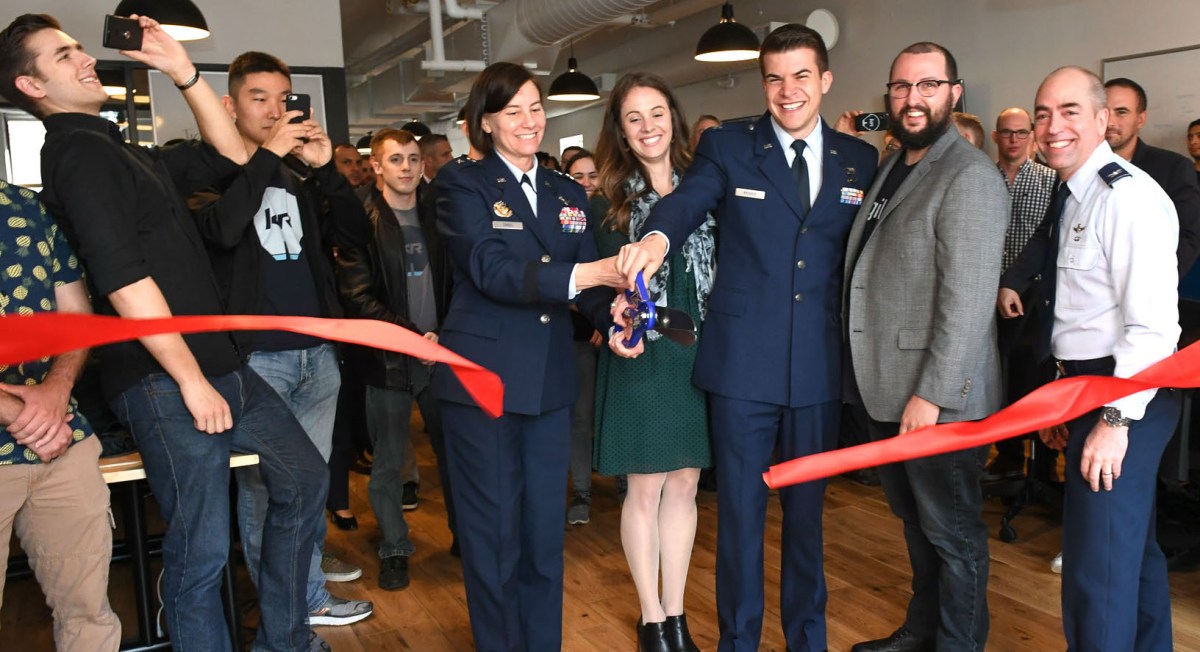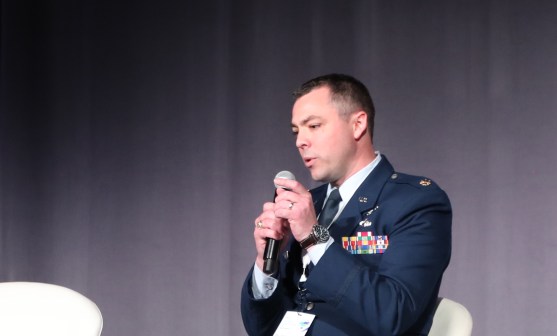Air Force looks to rapidly develop software with Project Kessel Run

It can take years for a federal agency to acquire a new technology — and by that point, the agency’s needs have often changed or the once-new technology has grown outdated. For a new team within the Air Force, however, launching a new software product takes just a handful of months, not years.
The Air Force’s Project Kessel Run, which officially opened its Experimentation Lab in Boston last week, is averaging 124 days — about four months — to get a technology product from an idea on a whiteboard to operational, says its chief operating officer, Capt. Bryon Kroger.
“Given that traditionally that timeline is on the order of eight years, that’s very significant,” Kroger told FedScoop.
The team got its start last year partnering with the Defense Innovation Unit Experimental (DIUx) to award a contract to San Francisco-based Pivotal Inc. to see if the development methodology known as agile and the software engineering practice known as DevOps “would work in the Department of Defense,” said Victoria Galvin, Project Kessel Run’s chief business officer. (The project’s name comes from a line about the speed of the Millennium Falcon ship in the “Star Wars” movies.)
That decision got a lot of press last year as it ultimately led to the development of an air tanker planning tool, which helped pair tankers with aircraft needing refueling, Kroger said.
“We were able to automate a lot of that process that used to be done on a whiteboard and that gained us a lot of efficiencies,” Kroger said.
Bloomberg reported last year that DIUx —the Pentagon’s experimental procurement group — worked with Air Force planners and a few Pivotal software developers “to set up a streamlined scheduling system in less than 120 days for $1.5 million.”
“It’s one thing to say you’re going to do business differently,” Maj. Gen. Sarah Zabel, the Air Force’s director of IT acquisition process development at the Pentagon, said in a statement. “But look around and you can see that these Airmen are learning. They’re building actual products, and they’re writing the book on how to be combat engineers for the information age.”
The Air Force uses a Pivotal service called Pivotal Labs, where project staff are paired with the company’s team to learn best practices around things like extreme programming and user-centered design, Galvin said.
Since the Kessel Run Experimentation Lab is now open for business in Boston, the plan is to have teams pair with Pivotal Labs staff for about six to eight months and then bring them back to the new lab, Galvin said. Kessel Run is sending airmen to Pivotal Labs in San Francisco; Denver; Cambridge, Massachusetts; and Washington, D.C., Kroger said.
“And we’re about to start one in their Chicago office as well,” he said. “So we’re in a lot of different tech hubs, leveraging a lot of different talents across their labs.”
Total staff for Kessel Run numbers around 100, including product teams developing the applications and the team managing the platform, Galvin said. Some of Kessel Run’s staff is permanent, but others are there on six-month tours, Galvin said.
“A lot of different organizations are providing airmen to come and what’s great is they come here and they provide value to us, and then we send them back to their units and now they’re trained programmers that can solve problems within their unit,” Kroger said.
At Pivotal you learn by doing, Kroger said.
“You’d come to them with a real problem to solve and you build real software built that you deliver to real operations, in our case to the classified network at the Air Operations Center,” Kroger said. “They do paired programming where two engineers sit at the same terminal and code on a problem. And then we also pair our designers with a Pivotal designer and our product manager with a Pivotal product manager. And they work, eight hours a day, five days a week on this piece of software.”
Not only is the team building software, but its learning how to do it in a better way from “Silicon Valley experts,” Kroger said.
“We’ve established a culture where those developers and those operators are tied at the hip,” Kroger said. “And that allows us to get our software out the door much faster, and to be able to run it more stable in production.”
The Pentagon’s acquisition system is built to acquire hardware, which requires extensive planning in advance of contracting, Kroger said.
“If you’re building a bridge you don’t want to change plans halfway through building the bridge,” he said as an example. “But with software it’s cheap and relatively easy to make changes as you go.”
The biggest shift for everyone to overcome, Kroger said, is getting out of the mindset of defining the entire thing you want to build upfront.
Taking a minimum viable product approach “changes the game,” Kroger said, which he explained as “don’t try to build the 100 percent solution. Build a 10 percent solution, get it out there, get feedback, and iterate on it.”
“And it’s still hard, don’t get me wrong, and we have a long ways to go to be able to institutionalize this and make it the norm across the Air Force,” he said. “But yeah there’s policy barriers, there’s security. You want to go fast but you still want to be secure, and that takes a lot of work as well.”
Through Kessel Run, the airmen learn and challenge each other, and are challenged by Pivotal’s employees, Kroger said.
“I’ll say there’s no talent shortage in the Air Force,” Kroger said. “Our airmen are incredible when we bring them into these labs and put them in this environment. I think number one is identifying people with a growth mindset, and airmen in general have a growth mindset… And so you put them in this environment and you get out of the way.”
Kessel Run is on a weekly release cadence, Kroger said. One team was even pushing every single day as it did an intensive stint of work with its users in the Middle East, Kroger said. “When I say pushing, I mean pushing it into the hands of the users on the classified network for real operations,” Kroger said. “So it’s changing the game on how the DOD builds and delivers software.”
Key to the project’s success is maintaining “tight communication loop” with warfighters to get feedback on everything that’s released, Kroger said.
Kessel Run has been able to push five applications to the classified network, Kroger said.
The project is currently working on a number of things, including how the Air Force plans air tasking orders, a document which tasks units to fly their aircraft, Kroger said. It’s also working on building a tool that automates mission reports, which have to be written for every mission that flies, Kroger said.






